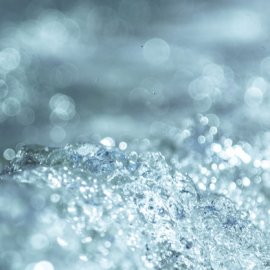My Meeting with the Alewives
-
English
-
ListenPause
WOR 718 – My Meeting with the Alewives
I’m Peter Neill, Director of the World Ocean Observatory.
Well met; we live in an ever-increasing schedule of meetings: weekly, monthly, teams, managers, a zoom of scheduled, non-scheduled expression of expanded systems communication, so many meetings in the name of efficiency that I am convinced that productivity, the ostensible goal, is being diminished, most inefficiently, by the stream.
To wit, I called a meeting. With alewives, an anadromous species of herring found in the west Atlantic Ocean where they thrive along shore, have been an historical catch for eating and bait, seasonally moving into estuaries before swimming up small streams to freshwater ponds to breed. Alewives are considered a “species of concern” by the US National Marine Fisheries, a result of overfishing a declining population the result of road culverts and dams that have limited access to the streams and ponds necessary for survival.
Where I live, in more and more places, those obstacles have been removed: the dams opened and fish ladders installed to allow the alewives to come to their historical breeding waters. And so, they do. Each spring, they arrive, first as courageous solos, then in groups of two and three, and then in a constant stream, at the place where I went to meet, at the rate of some 500 every thirty minutes, and there are thousands, maybe millions of them en route. The alewive is a very pretty fish, silver back, light belly, with a back fin that cuts the water to mark their direction, speed, and dexterity as they negotiate shoal after shoal of rocky stream, a release of energy that is driven and demanding and constant. Sometimes it can take a fish 12 hours to climb 100 yards, exhausting but determined.
These fish had been threatened by a system that saw advantage of channeling the streams for small water energy generators, or blocking them with a road indifferent to their need. The natural system was superseded by human necessity and no one gave a thought to the consequence. One assumes that these improvements were the result of many important meetings.
I counted hundreds arriving to the pond where I sat. How had this redemption come to pass? Around here, the story is well known: the determination of an individual, one man, by name of Bailey Bowden, who took it upon himself, no meeting required, to set things straight. By the force of stubborn determination, he enlisted conservation allies, convinced managers, and discovered the funds to enlarge the culverts, build the ladders, remove the derelict dams, and change the system back to the way it was. Bailey may not be a scientist, or a policy guy, or a lobbyist, but he is one hell of a citizen who saw things were wrong and set them right. The alewives are grateful; I am in awe of his success.
Why? Because one man made it happen. Oh yes, he enlisted others, but it would never have happened without his insight, his determination, and his perseverance. Sometimes, I think that the meetings just get in the way, that the systems postpone, complexify, and subvert the very things they were set out to do. Transformational change needs leadership – the one person to ask “what if?” The one person who won’t take “no” for an answer. The one person who by the authority of common sense can convince the deniers to change, the conventional thinkers to think again, the obsolete to be replaced by invention, ironically based on what was natural, was there before, what was thriving until we took a meeting and destroyed it in the name of progress.
Bailey Bowden gives me hope. Every alewive that makes that last exhilarating jump gives me hope. That it was “Alewive Day,” and folks were gathering for grilled fish and red dogs, printing T shirts with fish patterns, sharing information, sharing community, sharing what was a beautiful day in Nature, gives me hope. It was a very different kind of meeting: communal, empathetic, quiet, real., stream, fish, and man conjoined. It was an inspiration: that such a singular human action, in such a natural place, amidst all the systems thinking and process in which we live, could make hope real and realized. Nothing more be said. Meeting adjourned.
We will discuss these issues, and more, in future editions of World Ocean Radio.
This week on World Ocean Radio we are hailing the alewife: a species of herring found in the west Atlantic where they thrive along shore and seasonally move into estuaries before swimming up small streams to freshwater ponds to breed. Alewives are considered a “species of concern” by the US National Marine Fisheries, threatened by dams and re-channeling of streams that blocked their upstream trajectory each spring. Host Peter Neill recently communed with them as they spawned upstream; in this episode he proposes reasons for alewives to offer us hope.
About World Ocean Radio
World Ocean Radio is a weekly series of five-minute audio essays available for syndicated use at no cost by college and community radio stations worldwide. Peter Neill, Director of the World Ocean Observatory and host of World Ocean Radio, provides coverage of a broad spectrum of ocean issues from science and education to advocacy and exemplary projects.
World Ocean Radio
14 Years, 700+ Episodes
Ocean is climate
Climate is ocean
The sea connects all things
- Login to post comments



